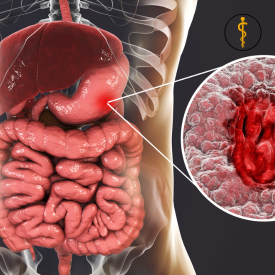General & GI Surgery

GI surgery/gastroenterology focuses on diagnosing and treating diseases and conditions affecting the gastrointestinal (GI) tract. The GI tract includes vital organs such as the mouth, esophagus, stomach, small intestine, large intestine, anus, liver, pancreas, and gallbladder. Dr. Mohit Agrawal specializes in both surgical and non-surgical management of GI-related issues.
Gastrointestinal surgery is a type of procedure aimed at addressing diseases of the GI tract. These surgeries, performed by skilled general surgeons, are essential for treating both non-cancerous and cancerous tumors, as well as other significant defects or abnormalities in the digestive system.
The gastrointestinal system is prone to a variety of conditions, some of which may require surgical intervention. These include:
Gastrointestinal conditions often manifest with specific symptoms. Some common signs that may indicate a problem in the GI tract include:
If you experience any of the above symptoms, it’s crucial to seek immediate medical attention. Early diagnosis and treatment can prevent complications and ensure a better outcome. Consulting a qualified gastroenterologist or general surgeon is essential if these symptoms persist.
While interventional gastroenterology procedures are generally safe, there are some risks and potential complications, including:
Gastrointestinal surgery is often a necessary step when other treatments have failed to resolve an issue. The benefits include removing tumors, correcting defects, and alleviating symptoms that interfere with daily life. Surgery can significantly improve the patient’s quality of life by reducing pain and preventing further complications.
General surgery and gastroenterology are vital medical fields that address various conditions of the gastrointestinal system. Specialists in this area, like Dr. Mohit Agrawal, utilize both traditional and minimally invasive techniques to diagnose and treat a wide range of GI issues. By employing advanced interventional procedures, patients can experience effective treatment with faster recovery times and improved overall outcomes.
Preparation typically includes:
1) Fasting for a specified period before the surgery (as advised by your surgeon).
2) Stopping certain medications, especially blood thinners.
3) Undergoing pre-operative tests, such as blood work, imaging, or endoscopy.
4) Arranging transportation and post-surgery care at home.
Yes, some medications may need to be stopped or adjusted. Consult with your surgeon about all the medications, supplements, or herbal remedies you are taking.
You may be advised to follow a low-fiber or liquid diet in the days leading up to surgery, depending on your condition. Clear instructions will be provided by your healthcare team.
The duration depends on the type and complexity of the procedure. Most gastrointestinal surgeries range from 1 to 4 hours. Your surgeon will provide an estimate during your consultation.
Hospital stays vary depending on the type of surgery:
1) Minimally invasive procedures: 1–2 days.
2) Open surgeries: 3–7 days.
Some discomfort is normal after surgery. Pain will be managed with medications, and your discomfort should gradually decrease as you recover.
Recovery timelines vary, but most patients can:
1) Return to light activities in 2–4 weeks for minimally invasive surgery.
2) Resume full activities in 6–8 weeks for open surgery.
Your diet will progress in stages, starting with clear liquids, followed by soft foods, and eventually returning to a regular diet. Avoid spicy, fatty, or highly processed foods initially.
Depending on the condition treated, you may need to make specific dietary adjustments, such as avoiding high-fat foods or increasing fiber intake. Your doctor or dietitian will guide you.
Yes, maintaining a healthy weight, avoiding smoking, limiting alcohol, and engaging in regular physical activity can promote healing and prevent complications.
Adopting a balanced diet, staying hydrated, managing stress, and scheduling regular health check-ups can help maintain gastrointestinal health.
Yes, follow-up visits are essential to monitor your recovery and address any concerns. These appointments may include physical examinations, lab tests, or imaging studies.
Yes, it’s completely normal to feel anxious. Discuss your concerns with your surgeon or a counselor, and seek support from friends or family to help ease your mind.
Focus on the positive aspects of improving your health. Joining a support group or speaking with a counselor can help if you’re feeling overwhelmed or stressed.
While surgery can sometimes lead to temporary emotional challenges, such as stress or mood swings, most patients feel better emotionally as their health improves.
Set small recovery goals, celebrate progress, and focus on your long-term health benefits. Engaging in hobbies, practicing mindfulness, and staying connected with loved ones can boost your mood.
Ready to take the next step towards expert and personalized care for General & GI Surgery?
Contact us today to schedule your consultation. Our experienced General & GI Surgery team is here to provide expert guidance and ensure your comfort throughout the process.